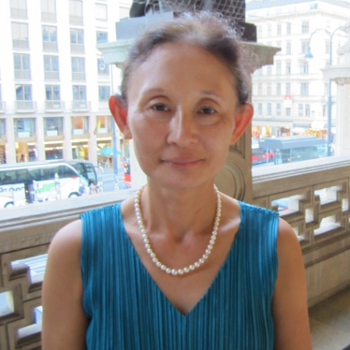The updating of opera productions that differs from the opera’s original setting and time period has become increasingly common recently, and Germany leads the way. So it is in Bayreuth, and the production of Der fliegende Holländer that is in its third season features a factory manufacturing electric fans as the female chorus sings their “Spinning Song”. The Dutchman is a coffee cup-touting travelling businessman who longs to escape from an endless journey of hotels and fleeting relationships. Daland owns the fan business, and is keen to strike a deal with the Dutchman after seeing his suitcase full of cash. Senta is an artist who works on a statue of the Dutchman while other women create more mundane fans. At the end of the opera, Senta stabs herself in the stomach, which results in the same injury afflicting the Dutchman. As the two embrace in death, the curtain closes momentarily while the music plays on; then the curtain reopens to show a final tableau of the factory now manufacturing the model of the two lovers in embrace. Capitalism triumphs over selfless love.
Some of the scenery, for instance the opening scene with a dark and claustrophobic tall structure with flashing neon of lines and numbers, is atmospheric of the doomed fate of the Dutchman. His duet scene with Senta is also effective, with the two standing as the stage slowly revolves to shift their large shadows on the background screen, creating an illusion of the two figures circling around each other first and then coming together. For the most part, however, the production is static and dull, and at best does not distract from the fine musical performance of the evening.
Christian Thielemann led the orchestra like a precision machine, and from the first note of the violin, the music of the ocean swirled all around with dynamic strings, finely-tuned woodwinds, and sonorous – but never too loud – brass. The overture began at a steady pace but the tempo quickened as the drama increased. From the covered pit of Bayreuth’s Festival House, one could imagine being literally thrust into a stormy sea. Other orchestral highlights include the fine playing of horn and woodwinds during the Dutchman/Daland duet, which was memorable with the two male voices blending in harmony. During Erik’s rendition of his dream, the orchestra perfectly captured the mood of tension and darkness and made the scene more than the usual lyrical interlude by a tenor. In the final music of sacrifice and redemption, Thielemann really let go of the orchestra, and the delicate melody of redemption played by the harp was then engulfed by the rest of the orchestra, until only the silence remained.
The quality of singing was uniformly strong and nearly matched the fine performance of the orchestra. Ricarda Merbeth depicted Senta as a wilful and somewhat maniacal character rather than a dreamy one, and her singing emphasized the underlying strength of the character. Her rich soprano was in excellent form, and she sang Senta’s ballad with clear lines but also with the necessary softness to create an outstanding effect. Her voice never flagged until the end, and her last utterance of the opera, “Hier steh ich, treu dir bis zum Tod!” was spine-chilling.
Her Dutchman, Samuel Youn, has a light lyric baritone voice which works well in his scenes with a heavier voiced Daland, as well as with Merbeth's bright soprano voice. Youn's monologue was sung while various characters (a hotel clerk, a masseuse, a prostitute) vie for his attention, but his singing never distracted from the woe and sadness of the character. His final moments may have lacked the necessary gravitas as he declares his identity and curses his fate, but his duet with Senta in the middle act was heartfelt and moving.
Veteran Kwangchul Youn sang Daland with great lyricism, and his higher notes were especially beautiful. His phrasing was smooth, but his voice has enough strength to establish the authority of the character. Benjamin Bruns was an outstanding steersman, his brilliant tenor voice penetrating the hall easily and memorably. He acted the part of the ambitious second-in-command to the factory owner Daland effectively as well. Tomislav Muzek was a husky Erik as factory handyman and made the most of his brief scenes; this Erik was an interesting and multi-dimensional character with vocal nuances. Christa Mayer was a rich-voiced and appropriately flustered Mary.
A good performance of Der fliegende Holländer requires a strong chorus, and the famous Bayreuth Chorus delivered exactly the kind of singing and coordinated acting that raises the standard of the musical performance from good to excellent. The male chorus has more to sing, and are a more integral part of the first and last scenes as the Dutchman’s crew and townspeople commenting on the proceedings. The women’s chorus displayed an astonishing degree of flexibility and dynamism as they packed the fans into boxes during their spinning chorus.
All the singers, particularly Merbeth, received large ovations at the curtain call, but the crowd reserved the biggest cheer for Thielemann, who seemed pleased with the performance of his orchestra, and congratulated the musicians during his appearance on stage. His mastery of Wagner’s music clearly added to the pleasure of attending the performance of Wagner’s first canonical opera in Bayreuth, if not the only reason reason for the wonderful evening.


